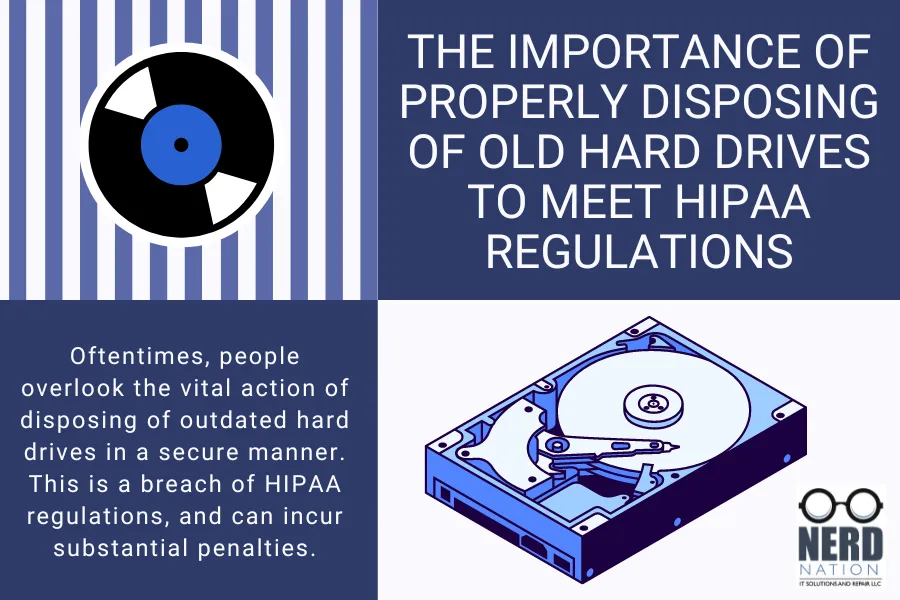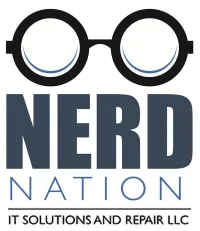Blog
Business IT articles and News

The Importance of Properly Disposing of Old Hard Drives to Meet HIPAA Regulations
The Importance of Properly Disposing of Old Hard Drives to Meet HIPAA Regulations
Oftentimes, people overlook the vital action of disposing of outdated hard drives in a secure manner. This is a breach of HIPAA regulations, and can incur substantial penalties.
Introduction
Properly disposing of old hard drives is essential for any organization that must comply with the HIPAA regulations. Degaussing or crushing the hard drive is necessary to ensure that all confidential information is securely erased and cannot be accessed by any unauthorized parties. This blog post will explain why it's important to properly dispose of old hard drives in accordance with HIPAA regulations, including degaussing and/or crushing the drive.

Understanding HIPAA Compliance
When it comes to protecting sensitive healthcare information, the Health Insurance Portability and Accountability Act (HIPAA) sets strict regulations for data privacy and security. Under HIPAA, organizations must safeguard patient information and ensure proper data destruction when disposing of electronic devices, including hard drives.
HIPAA compliance requires that all healthcare entities adhere to strict guidelines when handling and disposing of patient data. This includes ensuring that data is encrypted and stored securely, as well as implementing policies and procedures for secure data destruction. To learn more about HIPAA itself, see our blog post explaining it here.
One area that organizations often overlook when it comes to HIPAA compliance is the proper disposal of old hard drives. It's essential to understand that simply erasing or reformatting a hard drive is not enough to protect patient data. To be compliant with HIPAA, hard drive destruction methods must be implemented to ensure that the data cannot be recovered.
Proper hard drive destruction is essential to protecting the privacy of patient data and ensuring compliance with HIPAA regulations. By understanding the importance of HIPAA compliance and implementing the proper hard drive destruction methods, healthcare organizations can safeguard patient information and avoid costly violations.
Click here to learn more about our drive disposal services.
Risks of Improper Hard Drive Disposal
Improper disposal of old hard drives can pose a significant risk to sensitive data, including personally identifiable information (PII), protected health information (PHI), financial information, and more. Failing to dispose of old hard drives securely can lead to data breaches, which can result in hefty fines and damage to an organization's reputation.
One common mistake is assuming that deleting files or formatting the hard drive is enough to ensure data security. However, this is far from the truth. Even if you delete the files or format the drive, the data can still be recovered using special software. Simply throwing old hard drives in the trash can or leaving them lying around also increases the risk of data exposure.
In addition to the financial and reputational damage that a data breach can cause, failure to comply with HIPAA regulations can result in legal action against the organization. Under HIPAA, all covered entities, including healthcare providers, insurers, and business associates, must follow strict rules for the protection of patient data, and failure to comply can result in hefty fines and sanctions.
It's also important to remember that the risk of data exposure is not limited to physical access to the hard drive. If an old hard drive is not disposed of securely, it can fall into the hands of hackers who are skilled at retrieving data from discarded devices. As such, improper disposal can expose organizations to significant cybersecurity risks as well.
In short, the risks of improper hard drive disposal are numerous, including data breaches, financial losses, legal penalties, and cybersecurity threats. To avoid these risks and protect sensitive information, organizations must ensure that all old hard drives are disposed of securely by HIPAA regulations.
Methods for Proper Hard Drive Disposal

Once it’s time to dispose of an old hard drive, there are a few methods you can choose from. It’s important to select a method that ensures complete data destruction, and one that complies with HIPAA regulations.
Physical Destruction: One of the most secure methods of hard drive disposal is physical destruction. This involves using a specialized hard drive crusher or shredder to destroy the device, rendering it unusable. When done properly, physical destruction is an effective way to ensure that no data is recoverable from the drive.
Degaussing: Another method for hard drive disposal is degaussing. Degaussing involves using a specialized magnetic device to scramble the data on the hard drive. Once the data is scrambled, it becomes unreadable and unrecoverable. This is a good option for those who prefer a non-destructive method and want to reuse the hard drive for another purpose.
Encryption: If your hard drive contains sensitive information, encrypting it is a good way to protect the data when disposing of the device. This method involves encoding the data so that it can only be read by authorized parties who have the key to decrypt it. If the hard drive falls into the wrong hands, the data will be useless without the encryption key.
Data Wiping: Another method for hard drive disposal is data wiping. This involves overwriting the entire hard drive with random data, essentially erasing all previous data and rendering it unreadable. This method can be done with software, but it’s important to choose a reputable program to ensure proper data destruction.

No matter which method you choose, it’s important to ensure that it meets HIPAA compliance regulations. Proper disposal of old hard drives is crucial for protecting sensitive patient data and ensuring the privacy of individuals. Make sure to choose a reputable provider that is certified and knowledgeable in HIPAA regulations.
Degaussing and Crushing: The Most Secure Options
When it comes to properly disposing of old hard drives in accordance with HIPAA compliance, there are a number of options to choose from. However, two of the most secure and effective methods are degaussing and crushing.
Degaussing is a process by which the magnetic fields on a hard drive are erased, rendering the data stored on it unreadable and irretrievable. This is typically done using a machine specifically designed for degaussing, which uses a strong magnetic field to wipe the drive clean. Once a hard drive has been degaussed, it can safely be disposed of without fear of data breaches or security breaches.
Crushing, on the other hand, involves physically destroying the hard drive beyond repair. This can be done using a variety of methods, including using a specialized hard drive crusher or a hydraulic press. By crushing the drive, all of the data stored on it is irreparably destroyed, making it impossible for anyone to retrieve it.
Both of these methods are extremely effective at ensuring that the data stored on an old hard drive is safely and securely disposed of in accordance with HIPAA regulations. However, it's important to note that both of these methods require specialized equipment and should only be done by trained professionals.
If you're looking to dispose of old hard drives in a way that is HIPAA-compliant, consider using either degaussing or crushing to ensure that your data is securely erased and can never be accessed again. By following these best practices, you can rest easy knowing that you're doing everything you can to protect the sensitive data of your clients or patients.
Click here to learn more about our drive disposal services.
Best Practices for Ensuring HIPAA Compliance in Hard Drive Disposal
Proper disposal of old hard drives is crucial to ensuring that confidential patient information remains secure. Failing to comply with HIPAA regulations can result in heavy penalties and legal consequences, making it important for healthcare organizations to implement best practices when disposing of hard drives.
To help ensure compliance, organizations should start by creating clear policies and procedures for hard drive disposal. These should outline the steps required for proper disposal, as well as assign responsibility for carrying out those steps. This will help to ensure that all team members are aware of their roles and responsibilities in the disposal process.
Next, organizations should use reputable third-party service providers to dispose of their hard drives. These service providers should be vetted for their ability to securely handle and dispose of sensitive information, and should provide detailed documentation of their disposal methods.
In terms of disposal methods, degaussing and crushing are considered the most secure options. Degaussing involves exposing the hard drive to a strong magnetic field that erases all data on the drive. Crushing, on the other hand, involves physically destroying the drive, making it impossible to recover any data. Organizations should choose the method that best suits their needs, and ensure that it is done in accordance with industry standards.
Finally, organizations should maintain detailed records of all hard drive disposal activities. This includes documentation of the policies and procedures that were followed, the methods used for disposal, and any third-party service providers involved. By keeping detailed records, organizations can demonstrate their compliance with HIPAA regulations and avoid potential penalties or legal consequences.
Nerd Nation has the equipment available to degauss and destroy hard drives to ensure that patient data remains secure. For questions about our drive destruction service, give us a call at 307-296-1906.





